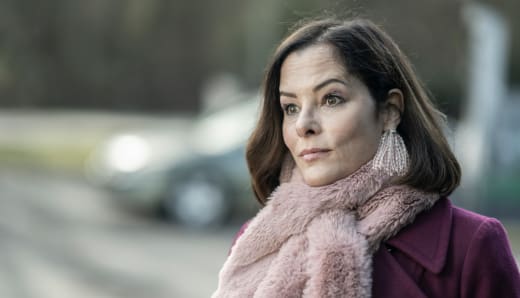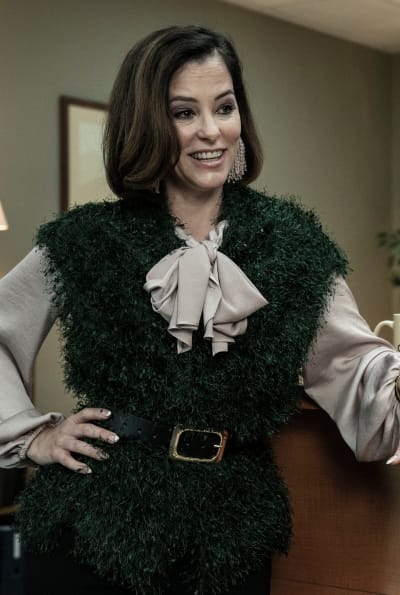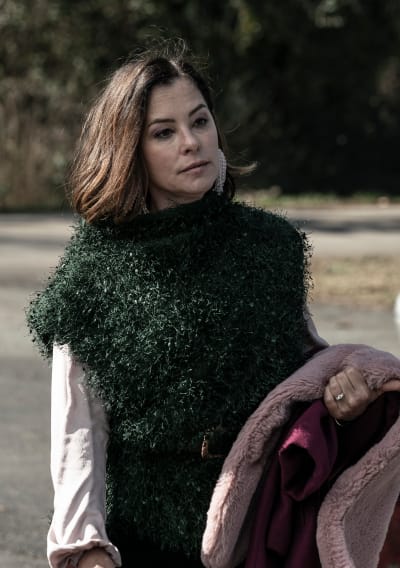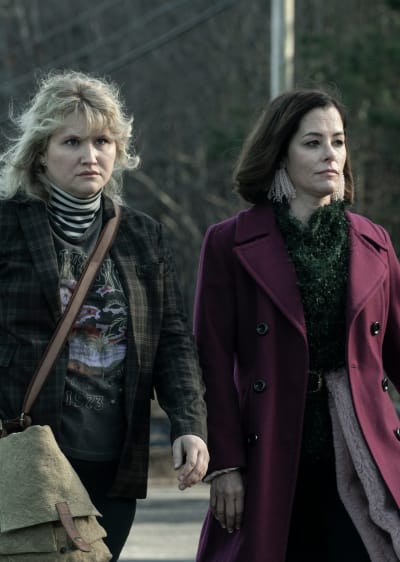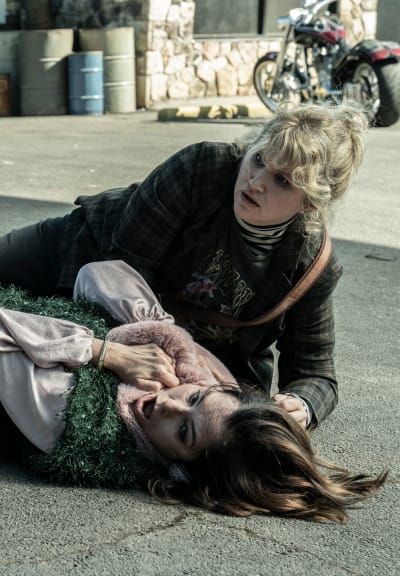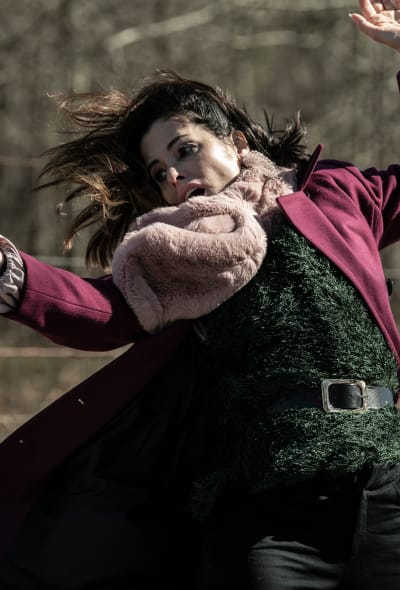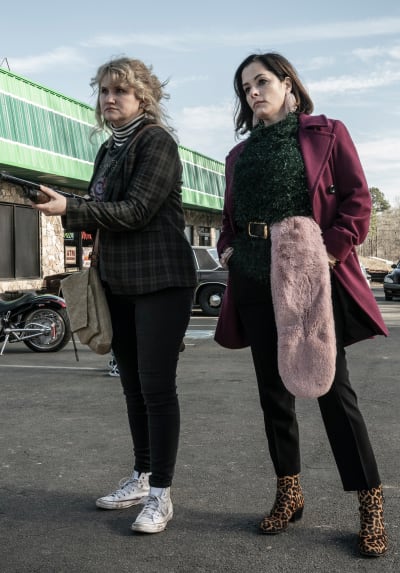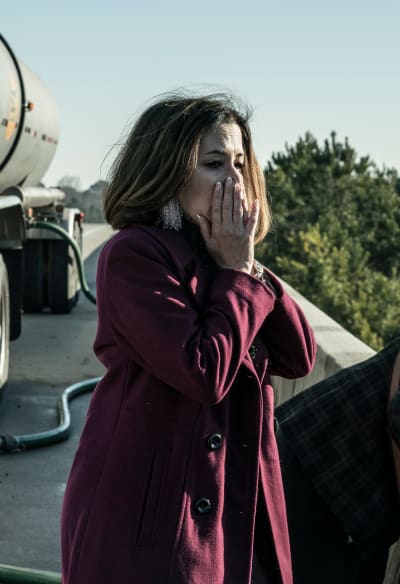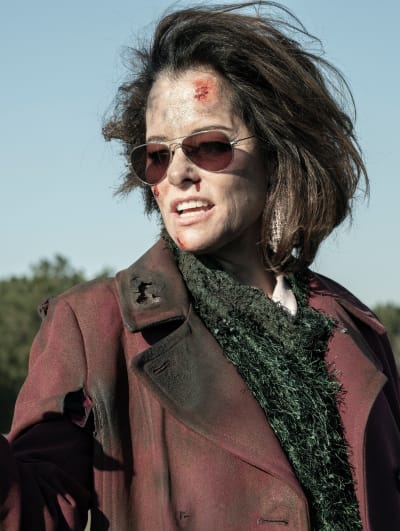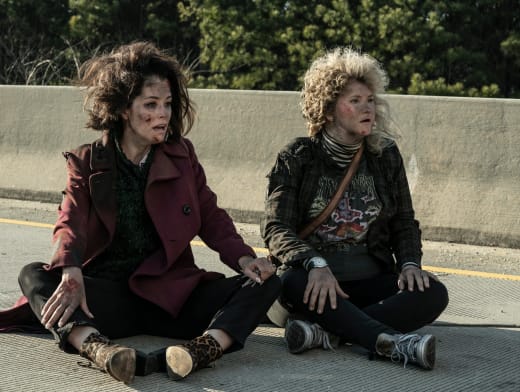
One of my favorite things about interviews is seeing things in a new light from the cast and creatives who bring entertainment to life.
From my perspective, tales of the Walking Dead “Blair/Gina” is a beautiful addition to the TWD universe.
As much as I enjoyed it and saw the symmetry between Blair and Gina, speaking with Parker Posey offers insight into the characters and story that only someone on the inside could provide.
Parker dove into The Walking Dead universe without any background. Well, very little by way of experience, anyway.
Parker hasn’t watched The Walking Dead or its offshoots for many reasons, including her fear of things that go bump in the dark and her desire to watch programming from start to finish without interruption.
She has recognized the force of The Walking Dead’s fan base, which, together with her appearance on Blair/Gina, will be the impetus for her to take it all in once she has the chance.
“I’ll be doing it because I know it’s good because it has such a strong fan base. So I was really happy to be part of The Walking Dead family. Carrie Drake wrote the part for me when we were doing the second season of Lost in Space,” Parker said.
“She didn’t write it for me then, but that’s where we knew each other. So I was really flattered.”
When asked how she mattered to put her fear aside to step into a world that brings fear alive for audiences, Parker shared that her father passed away as the project got underway. She was grateful for the opportunity to use what she was feeling for an entirely different purpose.
“I was in a real fear state, also shooting a show that had a lot of fear going on. I like having emotions and pretending that I’m in another world. That’s fun for me. I know that sounds crazy, but it’s, that’s what actors do, right?
“So to be able to express being really scared and someone who doesn’t really have a lot of cool about her is a blast.”
Parker was touched reading the script, “to look at it with the lens of grief and the anger and the rage that we have when we’re really vulnerable about something else when we have loss in our lives. And so, reading that, in the end, I was like, ‘oh my God, Carrie,’ I was so touched by it,” she said.
“And my dad was a really funny person. So it was great to keep his spirit in there and think about what would make him laugh. And so I feel lucky I can use that, in a way, as a language, as a healing kind of thing.”
Because of what Parker was experiencing, she viewed Blair and Gina as women reacting not so much to each other but to the outside forces that were manipulating their actions. Essentially, Parker used her pain to infuse meaning into the story that might not have otherwise been there.
“I found it really poetic. I know that sounds crazy. But, for me, it felt very layered and complex. And even though it’s not in The Walking Dead world, I like the world that Carrie wrote in this.
“We’re not really talking to each other; we’re talking to ourselves and our system that we have of boss and superior, and inferior positioning of bosses and employees, and how the bosses who are successful are the way that victims and monsters kind of go hand in hand.”
In playing Blair and working opposite Jillian Bell, Parker was reminded of her role in Clockwatchers “about being trapped in a system that doesn’t give us room to grieve, that doesn’t give us room for that kind of rage; you know you can call it patriarchy or whatever.
“So that was something else that I thought about. There’s really no space left but to run and just escape and not be; she’s not a human being to Gina.
“So when the world’s coming to an end, when you just have this one day, what does that look like compared to the structures that you used to live in and how you used to behave and treat people when, if you’re going to be a jerk, you’re just doing it to yourself.
“We’re kind of unhinged right now. So a lot of us are dealing with all sorts of traumas,” Parker said, noting that she was reminded of a character from Dark Shadows in the 1970s.
“Just this, a certain temperament that is this unhinged kind of entrapment, which is really fun to play. So yeah, we had a great time. It was fast and furious. I think it was 12 days. Jillian was fantastic. All the walkers, all the people in the office, my husband, it felt like an independent movie.
“It just really, really fast and furious,” she said of the shoot. “And the last day, I was screaming my head off, and Michael Satrazemis, he’s a rock star, and he really is like a drummer in a band. So there’s lots of energy and a real push. So yeah, it was fun. I was happy to be part of the world.”
Despite dying in many time loops as the episode progressed, by the end, both women were able to walk off into the sunset. Parker assured me that she, Jillian, and the hair and makeup department plotted how Blair and Gina might return to the world someday.
“We were the first show up in the season, and we were like, can we just come back and just be at the gas station or a pizzeria or the journalist at The View?”
She laughed, “We tried, we tried, but it was already a motion at that point. But we tried because we had a blast.”
She’s also very impressed with how the story suggested the relationship between Blair and Gina as one and the same.
“It’s really a great idea to have two people be the same person. It’s like, ‘Oh, we actually share something. We’re two sides of the same coin. I am you, and you are me.’ And there’s something really beautiful about that.”
Parker provided background to the story that I hadn’t considered, which changed how I viewed the story as a whole.
“Oh, cool,” Parker said. “I’m so glad because I think we’re so much about plot now, and the machinations of great storytelling, and ‘what’s going to happen now,’ and ‘that doesn’t really go with this or that.’ And they broke the rules in this game here.
“I think there’s some interpretation in how we look at things. If I had seen the show before, I might have played it differently. I don’t know. I’m glad it worked because it was pretty wild. It was unhinged. So I’m glad you liked it.”
Parker didn’t hesitate when asked what she thought became of Blair and Gina once they were out of the loop. “Best friends,” she said.
I laughed because as soon as they sat down on that bridge, covered in soot and looking much worse for the wear, and declared they would never be friends, it indicated the opposite.
“That’s right,” Parker agreed. “And when you have those honest moments, it’s that classic thing about friends or two people that don’t get along because there’s so much alike.
“So now, you’re in your ego because you’re competing, or you’re jealous because she has something I don’t have, and I have something that she doesn’t have.
“So it becomes a little bit petty; there’s pettiness instead of going like, ‘oh my God, you’re actually like my aunt. And you’re really like my mother. And you actually could be part of my family.’ And so the idea is that when we get close to people, and they bother us, that’s when we learn the hard stuff.”
The story suggests that it does help expand your horizons and help you realize that the world isn’t necessarily out to get you like sometimes you think it is.
“It’s transformative. And that was what I thought was really beautiful about it. There’s a catharsis at the end; we hear about her father, the explosion happens, and then the new horizons — what is next? I think I loved it when I read it. I thought it was wild. And really, I just found it really inspiring,” Parker said.
“So I hope people like it too. And that it gets them close to the show. And I don’t know; we want to do it again. We just loved working together. We loved Atlanta, and, yeah, too bad we’re not in the other episodes, just eating a bag of chips and complaining, just yelling at traffic. ‘Did you see that?’
“It doesn’t have to be a big deal, but we pitched it. We tried.”
Nothing seems impossible in the ever-expanding universe of The Walking Dead, and if Blair and Gina became friends after fighting off death through a time loop, you never know whether they’ll be seen again or not.
Carissa Pavlica is the managing editor and a staff writer and critic for TV Fanatic. She’s a member of the Critic’s Choice Association, enjoys mentoring writers, conversing with cats, and passionately discussing the nuances of television and film with anyone who will listen. Follow her on Twitter and email her here at TV Fanatic.

